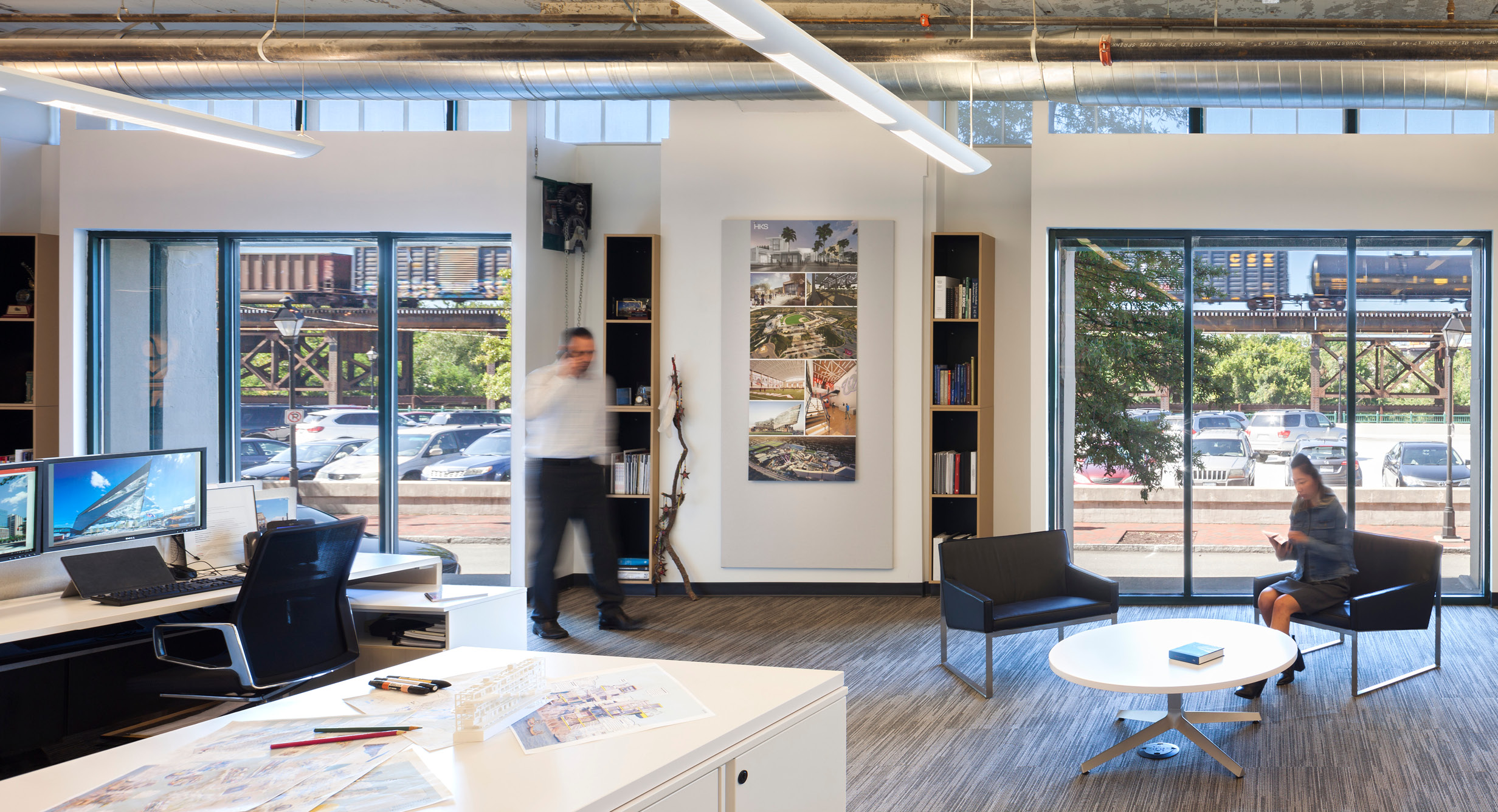
HKS’ Mid-Atlantic Design Fellowship Promotes Community & Sustainability in Richmond
At HKS, nurturing discussions on design is fundamental to achieving design excellence. One avenue through which we cultivate these dialogues is our Design Fellowship program.
The Mid-Atlantic Design Fellowship (MADF) initiative gathers collegiate students and HKS staff from our New York, Washington D.C. and Richmond offices to delve into significant design concepts. Suspended since 2020, the return of the MADF ignited inspiration and rekindled familiar feelings for many at HKS, highlighting the importance of limitless design thinking for all participants. This year’s design challenge focused on creating an engaging recreation center on an underutilized site in Richmond, Virginia.
Design Challenge
Richmond, Virginia, is a city steeped in history, serving as the former capital of the Confederate States during the Civil War. Its character is marked by historic landmarks and a vibrant arts scene, including theaters, galleries and music venues. The city’s diverse neighborhoods offer unique cultural experiences, while its culinary scene celebrates both Southern tradition and innovation, making Richmond a dynamic and engaging place to live and visit.
Richmond has also shown a commitment to environmental sustainability and community growth. Initiatives aimed at enhancing green spaces and promoting eco-friendly practices have been prioritized. The RVAgreen 2050 plan is a testament to this commitment, with goals to substantially reduce greenhouse gas emissions by 2030 and achieve net zero emissions by 2050, while also addressing climate-related challenges such as extreme weather and flooding.
The design challenge was to imagine a new outlook for a recreation center and its surroundings in Richmond, Virginia. Fellows were asked to prioritize the development of overarching concepts and establish objectives to shape the design approach while considering each user’s experience.
Site
The Wharf Street Tunnel Building on East Main Street, historically known as Intermediate Terminal 03, is an inactive terminal building owned by the City of Richmond Department of Public Works. Located adjacent to the highly popular James River, Intermediate Terminal #3 is an iconic landmark associated with Richmond’s vital port history. Built in 1938, it was one of the first buildings in Richmond that used reinforced concrete and remains structurally sound to this day.

Redefining Resiliency
During the fellowship, teams immersed themselves in the revitalization of a historically significant yet overlooked site in Virginia’s capital. The design fellows aimed to uncover a fresh architectural approach, seamlessly blending both natural and urban surroundings. Fostering community engagement and advancing environmental sustainability, their objective was to investigate how the constructed environment could harmonize with the James River, enhancing the area’s visual appeal and ecological vitality.
Meeting in person on March 8th, each team embarked on a collaborative journey, dedicating the weekend to crafting inventive design solutions. The weekend concluded on March 11th with an in-person presentation of their ideas to the Richmond office, sparking dynamic conversations and laying the groundwork for further exploration and refinement.

The Fellows
Three HKS employees and six students were selected for the 2024 Mid-Atlantic Design Fellowship. The fellows were divided into three teams:
Team 1: Armond Dai from HKS D.C., Maggie Williams from Virginia Tech, and Addie Merlo from James Madison University
Team 2: Dandi Zhang from HKS D.C., Ian McCarthy from the Washington Alexandria Architecture Center, and Lewis Wightman from Cal Poly SLO
Team 3: Mary Campbell from HKS Richmond, Courtney Thomas from VCU, and Gonzalo Vazquez Vela Novoa from Cal Poly SLO

Natural and Built Environments
The three teams devised different strategies to tackle the design prompt. Nevertheless, they all recognized that climate change and rising sea levels would eventually impact the site, shaping each of their designs accordingly.
A Third Place

Team 01: Armond Dai, Maggie Williams, and Addie Merlo directed their efforts towards crafting a “third place” – a public space distinct from both work and home environments.
Describing their design vision, Dai expressed that it, “extends a warm invitation to the public, celebrates nature and confronts the challenges posed by climate change.”
Within their proposal, the existing terminal building evolves into a testament to the dynamic interplay between nature and architecture, while also fulfilling a vital role as a community hub through its diverse programmatic offerings.
Paddle the Future

Team 02: Dandi Zhang, Lewis Wightman and Ian McCarthy studied the problems arising from the James River due to pollution. In the last three years, 38,000 pounds of trash and recyclables were removed from the James River. Through an innovative maker’s space program, Team 02 created a vessel to clean the James River, educate the public and create an accessible entry to the river.
Northbank

Team 03: Mary Campbell, Gon Vazquez Vela and Courtney Thomas started their concept with studying adolescent social engagement after the COVID-19 pandemic. The James River is known as a public space for teens to hang out outside of home and school but is only accessible in a handful of entry points. Their design creates anchored floating pods with varying public/private atmospheres to serve the community as a social hub along the riverfront.
Lasting Impression
The revival of the Mid-Atlantic Design Fellowship sparked an invigorating dialogue on sustainability, flexible design and community enhancement. Collaborating closely, the fellows crafted innovative concepts aimed at tackling climate change, preserving historic architecture and fostering community involvement. Rooted in a profound grasp of Richmond’s past, present and future, each concept narrative resonated with those local to Richmond. The 2024 Mid-Atlantic Fellowship showcased how weekend design charrettes nurture design prowess, driving vital discussions and positioning HKS as a leader in design innovation.

